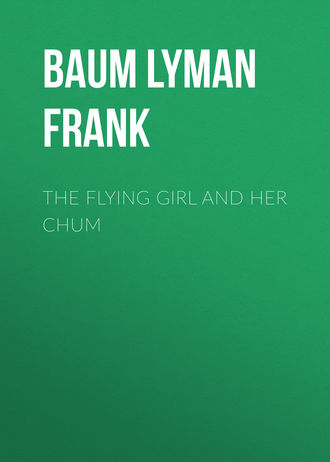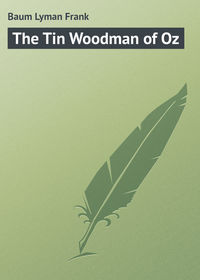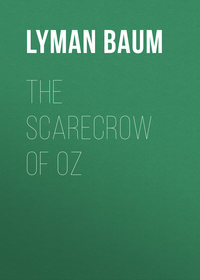 полная версия
полная версияThe Flying Girl and Her Chum
With one accord they all accompanied O'Reilly and his prisoner to the deck.
"Now," said Ramon, standing by the rail, "I have some men hid in those rocks yonder. Their names are Paschal, Mateo, Gabrielle, Gomez, Francisco, Pedro, Gonzales, Juan and Tomas. Tell me which one I shall call – I care not which, myself – and the man will assure you my orders are positive to them, and that they will carry out the explosion of the mine as I have arranged, provided I do not return in safety."
Cumberford was curious to learn the extent of the rogue's bravado.
"Call Mateo," he suggested.
The Mexican did so, raising his voice to utter the summons.
From behind a pile of rocks nearly opposite them sprang a thin, gaunt man. He ran down to the water's edge, saluted his chief and stood at attention.
"Come here, Mateo," commanded Ganza.
Without hesitation the man waded into the inlet and swam to the rope ladder which dangled over the side. This he seized and climbed on deck, where, dripping with water, he again faced his master and saluted him.
"Tell me, Mateo," said Ramon Ganza, "where is it, beneath this boat, that the mine has been planted?"
"Fourteen feet from the stern, Capitan."
"And is it powerful enough to destroy the ship?"
"To make it in small pieces, Capitan – an' ten ship like it, if ten ship were here."
"Very nice. You know what time the mine is to explode?"
"At eleven o'clock, Capitan, unless you come ashore to countermand the order."
"Ah yes; so it is. You may go back to your post, Mateo."
The man, looking neither to right nor left, descended the ladder, swam to shore and retreated behind the rocks again.
Ramon turned to Mr. Cumberford, showing the open face of his watch.
"In five minutes it will be eleven o'clock," he quietly announced.
"Take him to the cage, O'Reilly!"
Two other armed men had joined the engineer on deck and the three now surrounded Ganza and started forward with him.
"Mercy, Cumberford! Save us – save us!" howled Mr. Tupper, frantic with fear. "I can't die now – we ought none of us to die! Give him the launch. Give him the – "
A cry interrupted him. Mason, the man nearest the rail, dropped his gun and staggered back with his hands clasped to his side, from which a stream of blood gushed forth. At the same moment the huge form of Ramon Ganza leaped the rail and dove headforemost into the water.
But everyone else was more interested in the wounded man, who seemed to be badly hurt. Ramon Ganza was forgotten as the girls bent over the poor fellow with anxious looks.
"Have Mason brought to my own cabin, at once," said Madeline to Captain Krell.
They carried the wounded man below, to be placed in Madeline's roomy cabin. Mr. Cumberford was not a surgeon, but there was no one aboard who knew more of surgery than he and so he went to Mason's side at once.
Ganza had struck the man with a knife of the stiletto type, the narrow blade of which had penetrated his side just above the hip joint. Mr. Cumberford's "first aid" outfit, which the captain was able to supply, enabled him to stop the bleeding, but he was unable to tell how serious the injury might prove. The man was in considerable pain, which Cumberford partially relieved with a hypodermic injection of morphine.
During this interesting period no one gave a thought to the escaped Mexican, but when nothing more could be done for his patient Cumberford left the girls to watch over him and walked into the cabin, where he found Mrs. Tupper sobbing as if in great grief while her husband sat in his favorite despairing attitude, his head bowed on his arms.
"What's wrong?" demanded Cumberford, in surprise.
"Wrong!" cried Tupper, lifting his head; "why, at any moment may come the crash of the explosion that will send us all to eternity. We – we can't escape it. It's inevitable!"
Cumberford looked at his watch.
"It's a quarter to twelve," he said. "The explosion was due at eleven."
"But the Mexican brigand – the pirate chief – the – "
"He has escaped, so there'll be no explosion at all. I believe he threatened to fire the ship; but he won't do that. Ganza's sole ambition is to capture this boat, so he can sail away from his countrymen, escape imprisonment, and perhaps become a really-truly pirate. Interesting, isn't it? Forget the explosion, Tupper; if you must worry, worry about our real danger."
"What is that, sir? What is our real danger?" cried Madeline's uncle, springing to his feet in a new access of terror.
"There'll be fighting, presently," predicted Mr. Cumberford. "Having failed in all else, the Mexican will find a way to board us – in the night, probably – and will try to slice us to goulash or pepper us with bullets, as opportunity decides."
"Great heavens!"
"To be sure. To avoid getting to those great heavens, where you don't belong, I advise you to arm yourself properly and be ready to repel the attack."
Then Cumberford went on deck and found the captain.
"How about Ramon Ganza?" he asked.
"I think Ganza kept swimming and reached the shore, where his men dragged him to cover. The fellow seems to bear a charmed life."
"That's bad," observed Cumberford, shaking his head regretfully. "I've an idea, Captain Krell, that unless we manage to capture Ramon Ganza during the next twenty-four hours, he will manage to capture us."
"So soon?" asked the captain.
"He won't dare to wait longer. There's help coming."
"Well, sir, in that case – " The captain hesitated.
"In that case it will be pleasanter and more satisfactory for us to capture Ganza," said Mr. Cumberford. "Interesting; isn't it?"
"How can we do it?" asked Captain Krell.
"I don't know," replied Cumberford.
CHAPTER XXIV
THE DIPLOMACY OF CHESTY TODD
When Mr. H. Chesterton Radley-Todd discovered the one-eyed Francisco and his two comrades calmly seated in the Salvador's launch, engaged in nonchalantly smoking their brown-paper cigarettes, he merely raised his eyebrows and continued down the slope. They had seen him as soon as he saw them and, confident in their superior numbers, awaited his advance with serenity.
Chesty knew there was little chance of escape, and he knew the men knew he knew it. The launch was his sole resource, and the enemy had captured it. He might, perhaps, dodge behind the rocks on the mountain for an indefinite period, but they'd get him in the end, so such an undertaking was scarcely worth the exertion it required.
Therefore, on he came, walking leisurely and picking his way deliberately down the incline until he stood beside the launch, which was still beached upon the shore of the little pocket-like bay. Then he drew out a silver case and, choosing a cigarette with solicitous care, turned to Francisco and said:
"Will the señor favor me with a light?"
The men grinned. They enjoyed the humor of the situation. Francisco, with a bow of mock deference, furnished the required light from his own cigarette.
Chesty climbed into the launch, took a seat facing Francisco and remarked: "Fine day, señors."
"Good to fly in air," nodded one of the men, with a laugh and a glance skyward.
"Oh; did you see the machine fly? Pretty sight, wasn't it? And you boys saw it for nothing. In the United States we charge fifty cents to tickle the vision like that."
Francisco looked at him, meditating.
"Where they go?" he asked.
"To Mexico, to ask President Madero for a battleship."
The men exchanged significant glances.
"For why, señor?" inquired one of them.
"To come and get Ramon Ganza and clap him in prison. Perhaps hang him to one of those banana trees, on the bluff up there."
The Mexicans looked their consternation.
"If that is true," said Francisco, slowly, "then I may be capture an' put in prison, too."
"I suppose so; because you belong to Ganza's gang and have probably broken the laws more than once."
"I not murder," protested the man. "Ramon do that, I know; but not me. I very hones' an' good. But come," he added, throwing away his cigarette and rising. "We mus' go back. You are our prisoner, señor."
Chesty did not move. He took the silver case from his pocket and offered it to the Mexicans.
"Help yourselves, boys," he said. "There's no hurry. Let us sit here and have a little talk. When you get back to Ramon he'll be sure to keep you busy enough. This is a good time to rest."
They hesitated a little, but took the cigarettes and lighted them.
"I suppose," remarked Mr. Todd, leaning back with his arms clasped around his knees, "if I asked the warship to take Ganza, and let my friends – you are my friends, I suppose?" They all nodded, watching his face eagerly. "And let my friends escape – with me, in our yacht, the Salvador– they would do so without question. Madero knows me, and he usually does what I ask."
"You know Madero?" asked Francisco, his back against the boat and his elbows resting on the gunwale, in a lounging attitude.
"We are like twin brothers," asserted Chesty. "That is why he will send a warship to take Ramon Ganza and all his gang – except those who are my friends."
They smoked a while in silence and Chesty noted that they now forbore meeting one another's eyes.
"Ramon great man," said one, presently, as if to himself. "Ramon bad master; his people are dogs; but Ramon have his own way, an' nobody dare stop him."
"Wrong, my friend," rejoined Mr. Todd. "Ramon is stopped right now. His time is up; his days are numbered. He has run the length of his rope. Presently he'll be confined in a dungeon, on bread-and-water, or breaking stone on the roads – in chains and very miserable. Poor Ramon. What a fool he was to break the law – which leads to breaking stones!"
"Ramon very clever," suggested another man, but in a doubtful tone.
"Cleverness has failed him this time," said Chesty. "Your leader is caught like a rat in a trap. If he could get hold of our yacht he'd skip out and save himself; but he can't do that in a thousand years."
"An' why not, señor?"
"We're too strong for him."
They pondered this.
"Ramon have sixteen men," said Francisco, presently. "You had 'leven; but one fly away, an' one – that is you, señor – is now capture. That make you nine. Nine to sixteen – an' Ramon to lead those sixteen!"
"You didn't remain in school long enough to complete your education, Francisco," declared the prisoner, calmly. "In other words, you can't figure. Here's the real situation, and it's worth your while to study it: The yacht has a crew of seven – all splendid warriors. Then there's General Cumberford, a terrible fighter, and Major-General Tupper, who cries every night if he can't kill a man before he goes to bed – it makes him sleep better, you know – and the invincible Captain Krell, who once cut down a whole regiment with his own saber – chopped them into mince-meat by the hundreds, and was given a gold medal with his monogram engraved on it, to commemorate the event. That's an even ten defenders. And then there's myself. I won't say much about myself, but you might look me over carefully. It is possible that if I was aroused I might crush you three in my arms until your bones cracked like walnuts."
They did look at him, and it seemed as if the big fellow might do it, exactly as he said. But Chesty continued, reassuringly:
"However, I never injure my friends. I'm noted for that. Let's see; ten in our party, so far, wasn't it? Then there's that Red-beard – Pietro – who has been given a charm by one of our witch-women which will not only preserve his life but enable him to defeat all his enemies. Pietro desires to return to civilization, a free man, and we will allow him to do so."
They were much impressed by this statement. Chesty's idea of the "witch-woman" was destined to prove his most forceful argument.
"Pietro makes eleven," he continued, "and you three bring the number up to fourteen, which leaves Ramon but thirteen followers to be arrested with him – unlucky number, thirteen. Haven't you noticed it?"
"You think we join you, then?" asked Francisco, curiously.
"I'm sure of it. You are no longer afraid of Ramon, for his jig is up. You don't want to go to prison with him, because it is very disagreeable to break stone on the roads, I'm told, and in prison they deprive a man of even his cigarettes. I know you have been bad boys, all three of you, and until now the law has threatened you. But you have reformed. Remember, señors, you have reformed, and are now honest men. I will tell Madero, my friend the president, what honest men you are, and how you have helped to defy Ramon, the outlaw, and give him up to justice. Madero will then reward you, and you will live happy ever after."
It was an enticing picture. The men looked grave and undecided. In their hearts they hated Ramon; but they also feared him. For years they had lived in daily terror of the tyrant who ruled them with an iron hand, who whipped a man brutally if he incurred his anger, who dominated them so utterly that they grovelled at his feet like the curs they were. If they could be sure of Ramon's downfall; if they could believe this big American boy, who was fully as powerful of frame as Ramon himself, then they would gladly desert the tyrant and save themselves by joining his enemies. It was only their inbred fear of Ramon and their confidence in his cleverness in defying justice, that made them hesitate.
Chesty saw this. He racked his brain to find other arguments.
"You have witch-women?" asked one of the men, in an awed tone.
"Three of them, all very bewitching."
"One has fly away."
"Yes; to cast a spell over the captain of the Mexican battleship, and make him hurry. The two most powerful are still here on this island."
"Then why they not use their witchcraft to push your ship into deep water!" inquired Francisco, his one eye flashing triumphantly. "Why the witch-women let Ramon make trouble for you? Eh? Tell me, señor."
Chesty looked at the man reproachfully.
"How stupid you are, Francisco. Must we not keep Ramon busy, to hold him here until the warship comes? Why do you suppose we came to this island at all, and ran our ship high on the beach, without hurting it in any way! Did we lay a trap for Ramon? Did we coax him to come and try to capture us, that we might prove he is a wicked law-breaker? We do not seem much afraid of your Ramon, do we? Am I frightened? Do I grow pale, and tremble? Here – feel my pulse – does my blood beat faster in my veins because Ramon Ganza, the trapped criminal, is waiting here to be captured, and thinks he is making us worry?"
The two men exchanged a few sentences in Spanish. Francisco listened to them and nodded approvingly.
"The case is this, señor," he announced, addressing Mr. Todd. "We would like to leave Ramon. We would like to join your ship an' go back to Mexico, an' have pardon. But Ramon is not trap yet. Ramon great man. Many time he escape. If we leave him, an' he then capture your ship, Ramon flog us with whip, which make great pain in us."
"True, that might be the result if Ramon captures the ship; but he can't do that – not in a century of Sundays, which is a long time. And if you stay with Ramon you will surely be made prisoners when the warship comes, which will be in another day or two. You must make up your minds which is the most powerful – we and our witch-women, with the Mexican government and its warships to back us, or poor Ramon, who is caught in a trap. I like you, all three – but not too much. You are fine men – unless I am lying – and I would grieve to see you imprisoned with Ramon. But otherwise I do not care what you decide to do. Come with me and I will save you, just as I intend to save myself, from Ramon's anger. But if you stick to your old master I cannot say one good word for you when you face the Mexican authorities. Now I am tired talking. Make up your minds and let me know."
He carelessly rose, lighted another cigarette and strolled down to the water's edge, where he stood with his back to them. The three rascals took advantage of the opportunity and argued among themselves for half an hour.
"Señor!" called Francisco, who, as a trusted lieutenant of Ramon Ganza, was the more important of the three.
Mr. Radley-Todd came back to the launch.
"It is this way," explained Francisco. "We desire to be save, señor, but we have caution. We believe you speak true, but not yet have you conquer Ramon; not yet has the warship come to take him to prison. So we think of a way to be safe if Ramon win, an' safe if you win. It is but just to us, as honest men, that we do that way."
Chesty smiled, really amused.
"How childlike and bland you naughty, naughty men are!" he exclaimed. "But let me hear your clever plan to play both sides and win hands down."
"When we find you escape from ship," began Francisco, "then Ramon think you have come here, for the tent is gone from the top of the bluff. So Ramon tell us to come here in big launch, to see what you do, an' he say capture you an' bring you back to him. When we get here we find this boat; but two fly away in air-machine, an' only one is left to capture. But Ramon not know if we come before the two fly away or not; he not know if we three, who come to capture, get capture ourselves. So that is what we mus' do. We get capture. You tie up our arms an' our legs an' put gag in our mouth. Then you put us in boat an' take us away to your ship. If Ramon stop us, we say we have been capture. If Ramon see you take us on your ship, he think we have fight hard an' been capture, an' he sorry but not mad. Then, if he take your ship, he set us free; if warship come an' capture Ramon, we safe on your ship an' be hones' men, like you say, an' get reward from Madero. Is it not good way, señor?"
Chesty's sentiments wavered between indignation and admiration. Such a combination of low cunning, cowardice and absence of all shame he had never encountered in any being of human origin. But his cue was not to quarrel with the men at this time. It was enough to realize that instead of becoming a prisoner he was to carry his three captors, bound, to the ship, and so deprive Ramon of that many assistants.
In the outlaw's big launch, which was anchored just outside the tiny bay in the open sea, were plenty of stout ropes. Francisco waded out and got a supply, and then he proceeded deftly to bind his two comrades, trussing their arms to their bodies and their legs together, so that they were helpless. The fellows grinned with delight at this experience, thinking how cleverly they were fooling Ramon Ganza, and when they were laid side by side on the beach Chesty stuck a lighted cigarette in the mouth of each, to afford them comfort and render them patient. Then Francisco bound his own legs and turned to Mr. Radley-Todd, who at once completed the operation and fastened Francisco's arms to his body – not too tightly, but in a very secure manner.
When this was done the big boy breathed a sigh of contentment and set himself down beside his captives.
"Now," said Francisco, "you mus' put us in big boat an' go back to ship with us."
Chesty shook his head.
"Not yet, old man," said he.
"Not yet?"
"No; I shall wait for night. It will be safe in the darkness."
"Then you are 'fraid of Ramon?"
"Not much. Just a little."
The prisoners wriggled uneasily.
"Listen, then, Señor American," observed Francisco. "If we not go before night, then release our bonds – make loose the ropes – so we will rest more easy. When night come you will again tie us up."
Mr. Todd was unresponsive.
"Too much trouble, Francisco," he remarked, with a yawn. "Why do the work twice?"
"But – to lie here all day? San Sebastian, it is too horrible!"
"Fortunes of war, my dear boy. Ramon might appear unexpectedly, you know. We made a bargain, to ensure your safety, and we're going to keep it."
All three turned their heads to regard him with interest. There were sparks of glowering resentment in their dark eyes. Presently one of them said in humble tones:
"With your kind permission, Señor Americaño, I think I will change my mind."
"Certainly," replied Chesty; "do anything you please with your mind. It's yours, you know."
"I think, then, señor, I will not be your prisoner – until night."
"Don't think any such thing. It's wicked of you. Try to guide your thoughts into right channels. Make up your mind to be true to your bargain, because – you have to be."
Francisco groaned.
"All masters are cruel," he muttered. "This Americaño is as bad as Ramon!"
"But he's going to preserve your liberty and keep you out of jail," Chesty reminded him.
"And now, boys, try to sleep, for I'm going to take a little walk and stretch my legs."
CHAPTER XXV
SCUTTLED
A modicum of truth had been included in Ramon Ganza's recital of falsehoods during his interview with those on board the yacht. The outlaw was really in a tight place and only by forcing, in some way, the capture of the yacht could he hope to escape in a manner at all agreeable to his requirements.
By this time he was fully aware of the situation that confronted him. The flying-machine, if it encountered no accident, would reach the mainland and secure assistance for the stranded Americans. Perhaps it was true that President Madero would send a warship to capture him. Like most fugitive criminals, he had an exaggerated idea of his own importance. In any event he must abandon his island kingdom and seek another hiding place. His first intention – to make everyone of these intruders prisoners and subjects, so they could not betray him – was frustrated by the escape of the two in the aëroplane. It would be useless to capture the others when these two had already carried the news to the authorities who were seeking him.
Two courses of procedure were, open to Ganza. One was hastily to outfit his sixty-foot launch and run it to the South Pacific in search of some other island that was uninhabited, taking with him enough men and women to start a new colony. The other was to capture the yacht, put his most cherished possessions on board and then make off in it before any help could arrive from the mainland. The first was by far the most sensible course, but the beauties of the Salvador had so enraptured him and he was so well aware of the value a yacht would prove to him that he could not bring himself to abandon the idea of securing it until the last moment of grace had arrived.
This led him to consider how much time remained to him in which to carry out his intentions. He figured that at least thirty-six hours must elapse before any ship could possibly arrive. It was unlikely that the messengers would find a ship prepared to sail at a moment's notice, and therefore three or four days might pass before he would be disturbed by any outside foe.
Ramon had hoped to frighten the Americans into surrender and therefore had arranged the little drama so lately enacted; but the finale had disappointed him. There was no mine planted beneath the yacht, but he had instructed one of his men to answer to his call, no matter what name he cried out, and to make the statement to the Americans which he had so cleverly invented. He made a mistake in thinking the flag of truce would protect him, for these strangers were not so simple as he had believed; so he had been forced to attempt a desperate escape, which succeeded because it was so bold and unexpected.
Recovering his breath as his white flannels dried upon the rocks, Ramon Ganza carefully considered his next move in the game. The yacht was a glorious prize. He must certainly have it for his own. The people on board seemed unequal to a successful defense. There might be half a dozen determined men among them, but the rest were women and cowards. He laughed as he recalled Mr. Tupper's terror at his threats.
The outlaw decided to carry the ship by assault. A night attack would be best. As soon as Francisco returned with the launch he would call his men together and instruct them what to do. Being informed of every movement on the part of the besieged, Ganza was aware that three people had escaped in the small launch to the bluff where the flying-machine lay. As soon as he discovered that the tent was gone he had dispatched Francisco with two men to capture the three, or as many as he could find. When the aëroplane ascended Ganza watched it carefully and decided it contained but two people; therefore Francisco would find the other and presently return.









